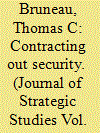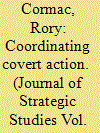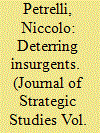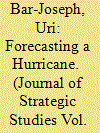| Srl | Item |
| 1 |
ID:
124171


|
|
|
|
|
| Publication |
2013.
|
| Summary/Abstract |
Private security companies (PSCs) currently receive a great deal of attention in the news media, in sensationalist reporting, and increasingly in scholarly books and articles. While the scholarly books and articles make significant contributions to our understanding of this global phenomenon, there are several impediments to analysis that must be recognized and overcome if analysis is to be improved. Three of these impediments are reviewed in this article. The author suggests that US government material is currently available to minimize impediments and offers a framework to make analytical sense of it. Since contracting out is based on contracts, and unless the complexities of awarding and managing contracts are understood, recommendations made to reform the process of contracting out security are unrealistic.
|
|
|
|
|
|
|
|
|
|
|
|
|
|
|
|
| 2 |
ID:
124173


|
|
|
|
|
| Publication |
2013.
|
| Summary/Abstract |
Focusing on British involvement in the 1960s Yemen Civil War, this article examines the centralised mechanisms developed in Whitehall to coordinate covert action interdepartmentally. It therefore sheds new light on London's security and intelligence machine and its input into clandestine operations. Drawing on recently declassified documents and interviews, it uncovers various important but secretive actors, which have been overlooked or misunderstood in the existing literature, and outlines their functions in the most detail yet available. In doing so, it considers how these bodies evolved in relation to competing threat assessments of the local situation and the impact they had on Britain's covert intervention in the theatre. This article assesses the utility of the system and argues that it provided an effective means to ensure that any covert action sanctioned was properly scrutinised so as to reduce risks and best meet national interests.
|
|
|
|
|
|
|
|
|
|
|
|
|
|
|
|
| 3 |
ID:
124172


|
|
|
|
|
| Publication |
2013.
|
| Summary/Abstract |
This article studies the Israeli 'way of war' in counterinsurgency in the period 1987-2005 by analysing the characteristic features of Israel's approach and its ability to adapt to the challenges posed by the Palestinian and Lebanese insurgencies. It first outlines the evolution of the Israeli counterinsurgency. It subsequently examines the Israeli approach through the lens of the country's strategic culture, illuminating its features, rationales and goals, and concludes by examining to what extent Israel managed to adapt to the challenges of fighting insurgents.
|
|
|
|
|
|
|
|
|
|
|
|
|
|
|
|
| 4 |
ID:
124174


|
|
|
|
|
| Publication |
2013.
|
| Summary/Abstract |
The surprising 'Arab Spring' raises the question as to what would enable national intelligence to provide high quality warnings prior to the eruption of popular revolutions. This article uses new sources of evidence to trace and explain Israel's success in comparison to US failure at correctly estimating the course of the Iranian Revolution in 1977-79. In explaining this variance, the article shows that it was mainly the result of the intimate acquaintance of Israel's representatives in Iran with the local language, history and culture, as well as the ability to communicate with locals - tools which the Americans completely lacked.
|
|
|
|
|
|
|
|
|
|
|
|
|
|
|
|